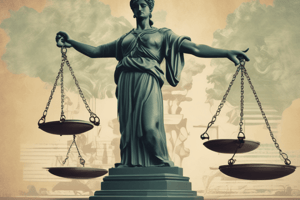Podcast
Questions and Answers
Every court is bound to follow any decision made by a court above it in the ______ of the courts.
Every court is bound to follow any decision made by a court above it in the ______ of the courts.
hierarchy
The ______ Court of Justice is the highest court affecting our legal system since 1973.
The ______ Court of Justice is the highest court affecting our legal system since 1973.
European
The House of Lords is the most senior ______ court in the English legal system.
The House of Lords is the most senior ______ court in the English legal system.
national
The ______ Court is prepared to overrule its own past decisions if it feels it is necessary.
The ______ Court is prepared to overrule its own past decisions if it feels it is necessary.
The House of Lords hears appeals from the ______ of Appeal and the High Court.
The House of Lords hears appeals from the ______ of Appeal and the High Court.
The approach to past precedents of the European Court of Justice is seen as ______ compared to the national courts.
The approach to past precedents of the European Court of Justice is seen as ______ compared to the national courts.
Appeals are normally heard by 5 ______ of Appeal in Ordinary.
Appeals are normally heard by 5 ______ of Appeal in Ordinary.
The ______ Division of the Court of Appeal hears appeals concerning civil law and family justice from the High Court.
The ______ Division of the Court of Appeal hears appeals concerning civil law and family justice from the High Court.
The High Court consists of 3 ______, the Chancery Division, the Family Division, and the Queen’s Bench Division.
The High Court consists of 3 ______, the Chancery Division, the Family Division, and the Queen’s Bench Division.
The Chancery Division deals with cases concerning ______, business disputes, insolvency, company management, disqualification of directors.
The Chancery Division deals with cases concerning ______, business disputes, insolvency, company management, disqualification of directors.
The Family Division deals with all ______ matters, including custody of children, parentage, adoption, family homes, domestic violence.
The Family Division deals with all ______ matters, including custody of children, parentage, adoption, family homes, domestic violence.
The Queen’s Bench Division hears ______ reviews, statutory appeals and application, application for habeas corpus.
The Queen’s Bench Division hears ______ reviews, statutory appeals and application, application for habeas corpus.
Flashcards are hidden until you start studying
Study Notes
Hierarchy of Courts in England and Wales
- The doctrine of judicial precedent is rigid in England and Wales, meaning every court is bound to follow decisions made by a higher court in the hierarchy.
Appellate Courts
- The European Court of Justice is the highest court affecting England and Wales for points of European law, and its decisions are binding on all other courts.
- The House of Lords is the supreme court for laws unaffected by European Union law and its decisions bind all other courts in the English legal system.
- The House of Lords is not bound by its own past decisions, but will generally follow them.
- The European Court of Justice is prepared to overrule its own past decisions if necessary, unlike the more rigid approach of national courts.
Court of Appeal
- The Court of Appeal is divided into Civil and Criminal Divisions.
- Both divisions are bound to follow decisions of the European Court of Justice and the House of Lords.
- They must usually follow past decisions of their own, with some limited exceptions.
High Court
- The High Court consists of three divisions: Chancery Division, Family Division, and Queen's Bench Division.
- Decisions of the High Court may be appealed to the Civil Division of the Court of Appeal.
- The Divisional Courts are bound by decisions of the European Court of Justice, the House of Lords, and the Court of Appeal.
- Each Divisional Court is bound by its own past decisions, with some exceptions.
Roles of Each Divisional Court
- Chancery Division: deals with commercial fraud, business disputes, insolvency, company management, and more.
- Family Division: deals with matrimonial matters, custody of children, parentage, adoption, and more.
- Queen's Bench Division: deals with judicial reviews, statutory appeals, applications, and more.
Studying That Suits You
Use AI to generate personalized quizzes and flashcards to suit your learning preferences.




